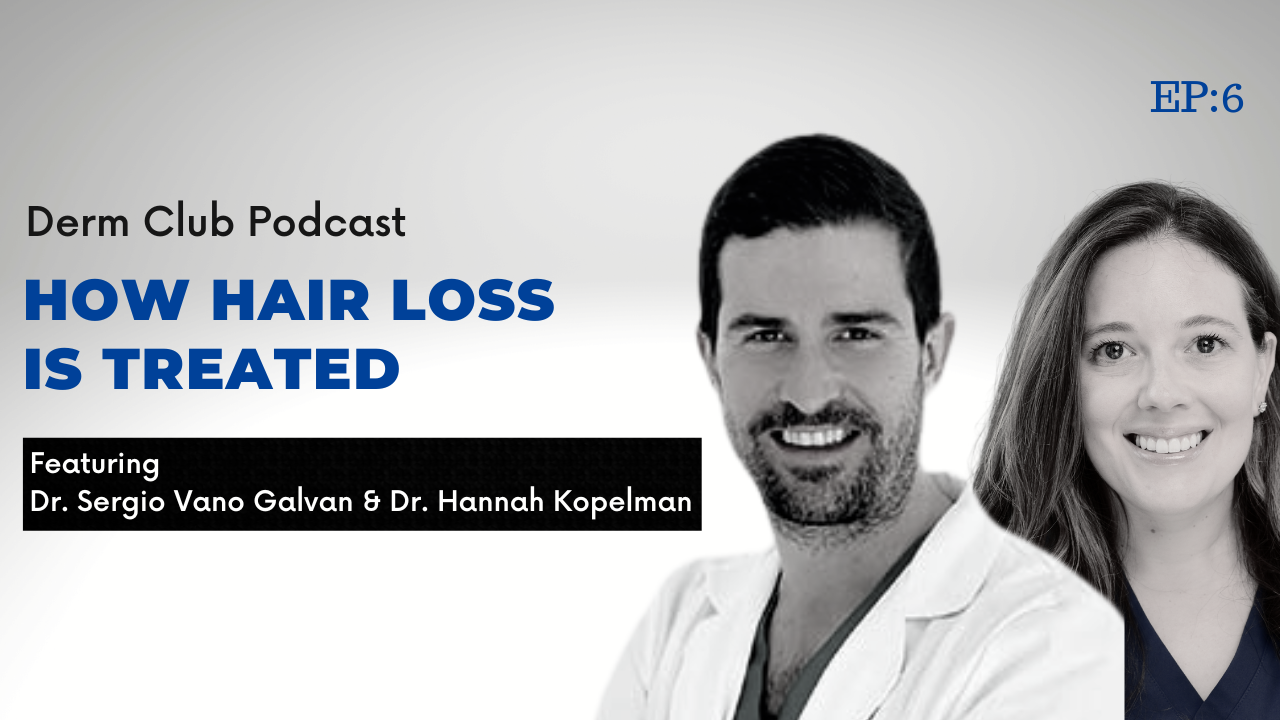Hair loss is a common concern affecting millions of individuals worldwide. While androgenetic alopecia (AGA) is the most prevalent type, another form called Frontal Fibrosing Alopecia (FFA) has emerged as a topic of increasing interest. To shed light on this enigmatic hair loss condition, we had the privilege of hosting Dr. Sergio Vano Galvan, a distinguished dermatologist and hair surgeon, on the Derm Club podcast. In our insightful conversation, Dr. Galvan shared his expertise on the rise of FFA and the available treatment options.
Understanding Frontal Fibrosing Alopecia
Frontal Fibrosing Alopecia, as Dr. Galvan explained, is a perplexing condition characterized by scarring and inflammation around the hair follicles. While its exact cause remains unknown, genetic susceptibility, immune system dysregulation, and hormonal factors are believed to contribute to its development. Dr. Galvan also highlighted the potential role of environmental triggers, including products like sunscreens and moisturizers, although further research is needed to establish solid evidence in this regard.
Treating FFA presents unique challenges due to the scarring and inflammation involved. Dr. Galvan discussed several treatment options that aim to stabilize the condition and prevent further hairline recession. Here are the key approaches he highlighted:
- Oral Anti-Androgenic Drugs: Scientific studies have shown the efficacy of oral anti-androgenic drugs, such as oral dutasteride, in managing FFA. Additionally, oral anti-inflammatory drugs like anti-malarials and steroids can be used to address the inflammatory component of the condition. Combining these therapies can help control inflammation and stabilize FFA progression.
- Hair Transplantation: In selected cases, hair transplantation may be considered as a treatment option for FFA. However, Dr. Galvan emphasized that hair transplantation should always be accompanied by medical therapy. He explained that while transplantation can increase hair density temporarily, it is not a substitute for ongoing medical treatment.
- Jak Inhibitors: Dr. Galvan expressed his enthusiasm for Jak inhibitors, a class of drugs originally developed for alopecia areata. Although Jak inhibitors are not widely used in Europe due to limitations and off-label usage, he believes they have the potential to revolutionize the treatment of various hair loss conditions, including FFA. Clinical trials evaluating their effectiveness in FFA and other scarring alopecias are expected in the coming years.
- Platelet-Rich Plasma (PRP): PRP therapy, which involves injecting concentrated platelets from the patient’s blood into the scalp, has shown some effectiveness in reducing inflammation associated with FFA. However, Dr. Galvan noted that the degree of effectiveness may vary among individuals and further research is needed to optimize treatment parameters.
Future for Hair Loss Treatment
Looking ahead, Dr. Galvan envisions exciting developments in the field of hair loss treatment. He highlighted the potential of regenerative medicine and stem cell therapies, which are currently under research, to restore lost hair in the future. These innovative approaches hold promise for addressing hair loss caused by various conditions. Furthermore, the utilization of robotic devices in hair transplantation is expected to enhance precision and overall treatment outcomes. Frontal Fibrosing Alopecia continues to present challenges in understanding its etiology and developing effective treatments. However, our conversation with Dr. Sergio Vano Galvan on the Derm Club podcast shed valuable light on this emerging hair loss condition. Through ongoing research and advancements in medical science, individuals affected by FFA can remain hopeful for more effective solutions. Dr. Galvan’s expertise and insights provided a glimpse into the future of hair loss treatment, offering a ray of hope for those seeking to combat FFA and other hair loss conditions.





